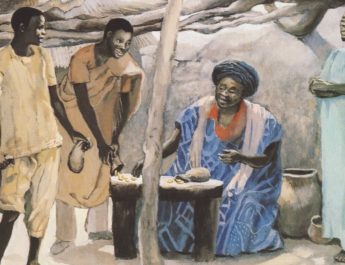Job 23:1-9, 16-17
Ordinary B46
1 Then JobA answered:B
2 “TodayC also my complaintD is bitter;E
A “Job” = Iyyob. Perhaps from ayab (to hate or be hostile to). This is Job a name that may mean “hated,” “enemy,” “persecuted,” “returning,” “no father,” or “where is my father?” See https://www.abarim-publications.com/Meaning/Job.html
B “answered” = anah. This is answer, respond, announce, sing, shout, or testify. It means to pay attention, which implies responding and, by extension, starting to talk. Used in a specific sense for singing, shouting, testifying, etc.
C “today” = yom. Root may mean being hot. This is the day in a literal or figurative sense. It can also mean birth, age, daylight, continually or other references to time.
D “complaint” = siach. 13x in OT. Perhaps from siyach (to muse, meditate, complain, sing, sigh, speak, or utter). This is a musing, concern, communication, or prayer.
E “bitter” = meri. From marah (to be contentious, rebellious, bitter, provoking, disobedient; to be or make bitter or unpleasant; figuratively, to rebel or resist; causatively to provoke). This is bitter – figuratively rebel or rebellion. It shares a root with Miriam and Mary.
his handF is heavyG despite my groaning.H
F “hand” = yad. This is hand, ability, power. Hand in a literal sense, but also what one can do or the means by which one does it.
G “is heavy” = kabad. To be heavy, weighty, or severe. It can also be positive abounding in, rich, or honorable. The Hebrew word for “glory,” kabod, is taken from this root.
H “groaning” = anachah. 11x in OT. From anach (to sigh, groan, or mourn). This is sighing or groaning.
3 Oh, thatI I knewJ where I might findK him,
that I might comeL even to his dwelling!M
I “oh, that” = mi + natan. Literally, “what he will give.” Mi is a word used to ask questions about people such as who, which, whoever. It can also be an interjection – oh. Natan is to give, put, set, offer. It is to give literally or figuratively.
J “knew” = yada. This is to know, acknowledge, advise, answer, be aware, be acquainted with. Properly, this is to figure something out by seeing. It includes ideas of observation, recognition, and care about something. It can be used causatively for instruction, designation, and punishment.
K “find” = matsa. This is to find, catch or acquire. It can also mean to come forth or appear. Figuratively, this can mean to meet or be together with.
L “come” = bo. This is to enter, come in, advance, fulfill, bring offerings, enter to worship, attack. It can also have a sexual connotation.
M “dwelling” = tekunah. 1x in OT. From kun (properly, in a perpendicular position; literally, to establish, fix, fasten, prepare; figuratively, it is certainty, to be firm, faithfulness, render sure or prosperous). This is something prepared or fixed. It is a place, structure, arrangement, set.
4 I would layN my caseO beforeP him,
N “lay” = arak. This is to arrange by setting in a row. It can also mean to set a battle, estimate, put in order, or compare.
O “case” = mishpat. From shaphat (to judge, defend, pronounce judgment, condemn, govern). This is a verdict or formal sentence whether from humans or from God. It includes the act of judging as well as the place that judging takes place, the suit itself, and the penalty. Abstractly, this is justice, which includes the rights of the participants.
P “before” = paneh. From panah (to turn, face, appear). This is face in a literal or figurative sense. It could be face, presence, anger, respect. It can also be used of God to indicate divine favor or presence.
and fillQ my mouthR with arguments.S
5 I would learnT whatU he would answer me,
and understandV what he would say to me.
Q “fill” = male. This is fill, satisfy, replenish, accomplish, fulfill, confirm, or consecrate. It is fill in a literal or figurative sense.
R “mouth” = peh. This is mouth in a literal or figurative sense. So, more literally, it can be beak or jaws. More figuratively, it refers to speech, commands, or promises.
S “arguments” = tokechah. From yakach (to decide, be right, argue, or convince; to decide, convict, reason together, or reprove). This is correction, rebuke, punishment. It can also be evidence used in court.
T “learn” = yada. Same as “knew” in v3. See note J above.
U “what” = millah. From malal (to say, speak; often used in a poetic sense). This is something said – a word, speech, talking, or discourse.
V “understand” = bin. This is to discern, consider, attend to. It refers to distinguishing things in one’s mind or, more generally, to understand.
6 Would he contendW with me in the greatnessX of his power?Y
No; butZ he would give heedAA to me.
W “contend” = rib. This is properly to toss or grapple. It is used figuratively to mean wrangling and so for arguments, complaints, or disputes. It is used in a legal setting for pleading or defending a case.
X “greatness” = rab. From rabab (increasing in any aspect whether quantity, authority, size, quality, greatness, etc.). This is abundance, many, elder, exceedingly, great. It refers to abundance of amount, rank, or status.
Y “power” = koach. Root may mean to be firm. This is power, strength, force. It can be literal or figurative, positive or negative. It can also mean capacity or means – what something produces. Additionally, it could refer to some kind of small reptile.
Z “but” = ak. Related to “dwelling” in v3. Related to aken (surely, truly, nevertheless); from kun (see note M above). This is a positive statement – surely, also, certainly, alone, only.
AA “give heed” = sum. This is to put or place in a literal or figurative sense. It can be appoint, care, change, make, and may other things.
7 There an upright personBB could reasonCC with him,
and I should be acquittedDD foreverEE by my judge.FF
BB “upright person” = yashar. From yashar (to be straight, right, even, smooth, or agreeable; figuratively, to make something pleasant or prosperous). This is straight, right, level. Also, it is pleasing, whether pleasing God or pleasing other people. So, it is upright or righteous.
CC “reason” = yakach. Related to “arguments” in v4. See note S above.
DD “acquitted” = palat. This is to escape, slip out, deliver, carry away, or calve.
EE “forever” = netsach. From natsach (something that glitters from a distance or stands out, excels, has status/standing; also to be permanent or enduring). This is properly a goal or destination as the bright focus to which one journeys. It can be splendor, truthfulness, or confidence. Most often, it refers to everlastingness, always, continually.
FF “judge” = shaphat. Related to “case” in v4. See note O above.
8 “GGIf I goHH forward,II he is not there;
or backward,JJ I cannot perceiveKK him;
GG {untranslated} = hen. This is a remark of surprise or excitement: lo! Behold! It can also mean if or though.
HH “go” = halak. This is go, come, walk. It is walk literally and figuratively and includes people and animals. It can be used figuratively for one’s moral life – how we walk according to God’s way or against it. It can also refer to the walk of life as in the course one’s life takes, the choices we make, etc.
II “forward” = qedem. Perhaps from qadam (to come in front or be in front; to meet, anticipate, confront, receive, or rise; sometimes to meet for help). This is front, formerly, before, east, eternal, everlasting, antiquity.
JJ “backward” = achor. From achar (to be behind, delay, be late, procrastinate, continue). This is the back, behind, backward, time to come. It can also refer to facing to the north or the west.
KK “perceive” = bin. Same as “understand” in v5. See note V above.
9 on the leftLL he hides,MM and I cannot beholdNN him;
I turnOO to the right,PP but I cannot seeQQ him.
LL “left” = semol. Perhaps from the same as simlah (mantle, clothes, wrapper); perhaps from semel (image, figure, likeness). This is left, left side, or north as the part that is dark.
MM “hides” = asah. This is to make, do, act, appoint, become in many senses.
NN “behold” = chazah. This is to gaze at – to see or behold. It can also refer to perceiving as a mental process or looking at something with pleasure. It can be used particularly to mean seeing a vision.
OO “turn” = ataph. 16x in OT. This is to turn, faint, hide, be overwhelmed, cover, fail.
PP “right” = yamin. May be from yamam (to go or choose the right, use the right hand; to be physically fit or firm). This can mean right hand, right side, or south. Since most people are right-handed, the metaphorical usage of this word presumes that the right hand is stronger and more agile. Thus, it is the instrument of power and action.
QQ “see” = raah. This is to see in a literal or figurative sense so stare, advise, think, view.
16 GodRR has made my heartSS faint;TT
the AlmightyUU has terrifiedVV me;
RR “God” = El.
SS “heart” = leb. May be related to labab (to encourage; properly, to be encased as with fat; used in a good sense, this means to transport someone with love; used in a bad sense, it can mean to dull one’s senses). This is the heart, courage, one’s inner self, the mind, or the will. Heart is only used in a figurative sense in the Old and New Testaments.
TT “made…faint” = rakak. 8x in OT. This is to be tender, soft, faint, weak. It is to soften or mollify.
UU “Almighty” = Shaddai. Perhaps from shadad (to ruin, assault, devastate, oppress, destroy completely; properly, it is being burly; figuratively it is something that is powerful) OR from shed (protective spirit) OR shadah (to moisten) OR shad (breast). Perhaps meaning almighty, “my destroyer,” “my protective spirit,” “my rainmaker,” “self-sufficient, “who is abundantly,” or “breasted one” – as the one who abundantly provides or grants fertility/abundance to humans. See https://www.abarim-publications.com/Meaning/Shaddai.html#.Xxi6Ep5KhPY
VV “terrified” = bahal. To be afraid or dismayed or amazed. This is deep trembling within. So, figuratively, it refers to being suddenly agitated. This implies moving or acting quickly/anxiously.
17 If only I could vanishWW inXX darkness,YY
and thick darknessZZ would coverAAA my face!BBB
WW “vanish” = tsamath. 15x in OT. This is to destroy, cut off, silence, or vanish. It is to put an end to in a literal or figurative sense.
XX {untranslated} = paneh. Same as “before” in v4. See note P above.
YY “darkness” = choshek. From chashak (to be or become dark). This is literal darkness is contrast to light. Figuratively, it can be obscurity, sorrow, misery, blindness, wickedness, destruction, death. It can also be hiding places. Additionally, it can mean judgment, mourning, ignorance, evil, or sin.
ZZ “thick darkness” = ophel. 9x in OT. Perhaps from the same as aphel (gloomy – unused root which refers to the sun setting i.e. dusky, dark). This is darkness, gloom, dusk, obscurity.
AAA “cover” = kasah. This is to cover, conceal, overwhelm. It is to cover as clothes do or to hide a secret.
BBB “face” = paneh. Same as “before” in v4. See note P above.
Image credit: “Untitled” by Mitch Loeber, 2005.




